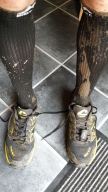One after another, everything went pop.
Head, legs, me.
Despite being fitter than I’d ever been, I certainly wasn’t happy. I should have been; family-perfick. Running- best it had ever been. I’d even joined a band again, but the first clue to the slide in my mental health was the person who suggested that maybe I pretend I was a guitar god: my CBT therapist.
The lads who had asked me in the first place, who were among the people closest to me and who I’d been in a band with before, watched their mate shrink and cower at… what? A feeling doesn’t have language.
But when I tried to write it down as part of the therapy, it came out like this:
‘Some people say it’s like being in a cloud, and I know what they mean. There is no form, shape, or colour. But it’s also like standing outside of the storm, watching the bank of swirling grey and livid red head towards you. The cloud looks gradual, but that is because it is huge, and its dead reckoning is an inevitable crash. Your crash. And it’s enormity expands. You won’t escape this one. Inside, there are no dimensions. Outside, there is no hope.
So yeah… It’s like a cloud. Just not the one you thought it was like.’ I might put that in a book, one day.
I had reduced myself to a shell who went to work to be hollowed out more. Every weekend and holiday was a release and experience that refilled the void with what I needed and loved. Time with Helen and the kids reset my happy-ometer. But the work me, and how I was coping with him, was frantically spiralling out of control. I gave in to him.
Just six weeks after the London Marathon, I ran out of me.
I remember bits of the week I conked out but most of it was just numb. I remember speaking to the doctor on the phone in the little classroom at the back of the school library. She picked up on two things: ‘runner’ and ‘teacher’. She suggested one was far better for me than the other.
And she suggested that I keep doing it. So I did. A lot.
Helen and I would drive to the coast on her day off, and run 10k. 5k out and back. Coffee by the sea. It was a glimpse of a me and a life that we could have if I could control my inner monologue. Other days, I’d drop off Tom at school and then head out. I didn’t even know where I was going.
I’d get up, sort out Tom, take him to school, run 14 miles, come home, eat breakfast, then watch the Tour de France for five hours while I tried to figure out what to do next. This was recovery. I needed to unfold my head but it was so crumpled I didn’t even know where the corners were.
I was so tuned to what I had previously prioritised that I struggled to slow down my thoughts. I already knew the sequence of imagined events because I’d inadvertently and habitually created those thought paths in my mind. By now, I couldn’t help it. That inner monologue would go from ‘flat but coping’ to 100% doom in an instant, without missing a word.
Sometimes the thoughts weren’t catastrophising. Sometimes they were a character assassination. My head told me what it thought of me, and it wasn’t very nice. This happened whenever I woke up, which meant I didn’t really look forward to sleep.
So I went for a run, because somehow, that slowed down the catastrophic crash, and the personality self-assessment would go in a drawer in my mind, just for a while. But the relief was never permanent, and I’d be back to judge myself.
One week I did double the mileage of my highest marathon training and I didn’t even notice until I added up the miles. Eighty-five. Ask any runner or coach and they’ll tell you the same thing: that is a huge jump in running volume, and you will hurt yourself.
Like any medicine, too much running is not good. Eventually, my left knee said enough was enough and decided that if I was ignoring the twinges, maybe fully-blown patellar tendonitis would get me to stop. And it did. In May, I would run ten miles and barely remember I’d been out. In August, I struggled past five, and would have my knee wrapped in ice and elevated afterwards.
I had literally ran myself into the ground.
